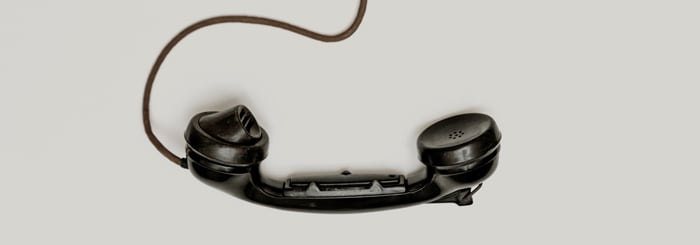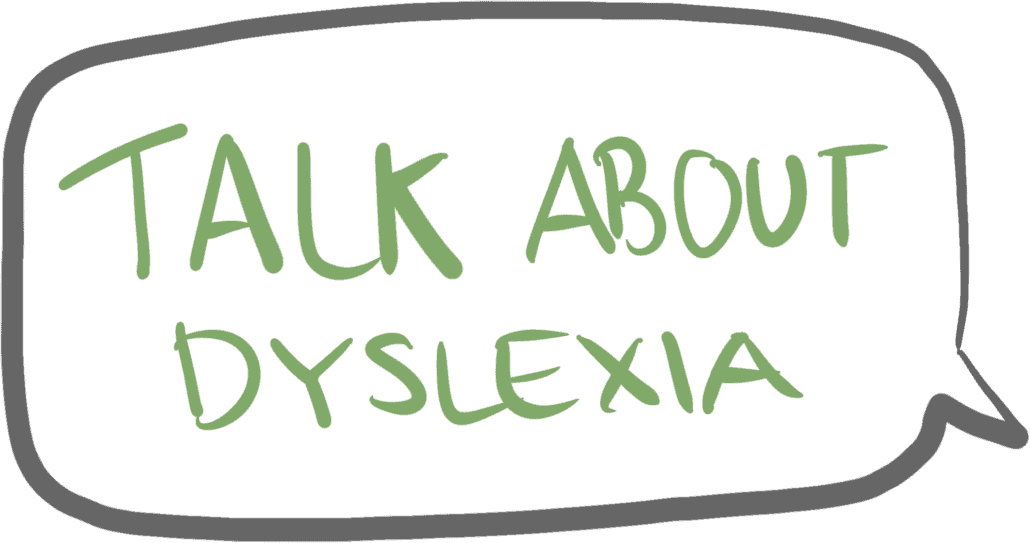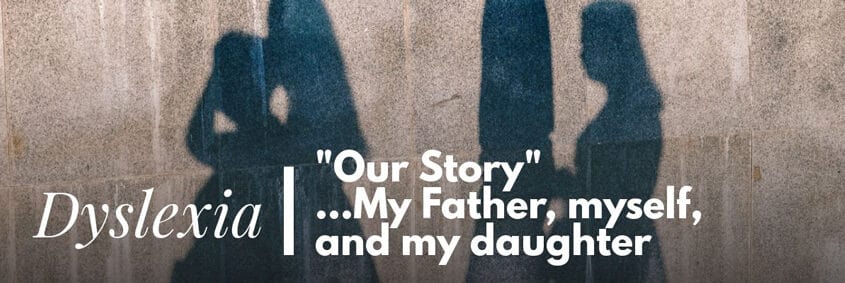“Our Story”…My Father, myself, and my daughter
I don’t know why I am writing this, mostly like because I cannot speak it without getting emotional…an odd thing for a 41 year old father to say. Maybe it is because I think others can relate and it might help them.
I have three kids, my oldest is a 12 year old girl. She and I are very similar, in all the great and not so great ways parents can see themselves in their children.
She started kindergarten with all the optimism we muster for our children. She is bright, charming, brave, feisty, and ornery..a fun combination in my estimation. After about 2 months, her teacher disagreed.
She thought she was not focused, not attentive, not working hard enough, and had ADD (although she said she wasn’t allowed to actually say that). We committed to working with our daughter. We read to her, tried flash cards, we spent hours on work, but to no avail.
I Struggled Too
As a child, I too struggled with these same issues, I am embarrassed to say that I didn’t recognize or relate her struggles with my own. I too believed the narrative, that she needed to work harder, focus more.
My wife, with a Masters in Engineering (wicked smart), didn’t understand why she didn’t get it. In reality, my daughter could look at the same flash card 25 times…the 26th time, it wouldn’t connect.
She Was Not the Kid We Knew
From K-3rd grade, we worked with reading specialists, the school ‘experts” to get her on track, but she was falling further behind. Not only that, the child they described to us: shy, hiding in the back, never raises her had, was not the child we knew outside of school. Something was wrong.
In one of our school meetings, which had become more of a fight, where my wife and I were pushing for an IEP and 504 plan, it suddenly hit me. All of my own struggles, which I must have repressed, all of my old feelings of struggle, feeling left behind, less than, of feeling stupid..they all come flooding back to me.

I got emotional and couldn’t even talk about my daughters issues without struggling with my own…they were linked whether I liked it or not. I was scared that she was going to struggle like I had.
I felt lucky to have survived, I was worried she might not be as lucky. My wife never knew how I felt, I never told her about my struggles. As a child, I struggled, but as an adult, I developed great confidence and competency in other areas that helped me be successful in life.
Background
Some background: As a child, I struggled a lot. I compensated by acting out in school, pretending I didn’t care. In the 6th grade, I had forgotten how to write, and I ended up relearning a bastardized version of cursive and printing. I was diagnosed with dyslexia and dysgraphia.
My Father recognized my issues, and he worked to get me help, but I was older and much of the social damage was done…I believed the narrative the school had told me.
As I got older, I focused on other things, such as girls, partying, and drugs (not hardcore, just marijuana). I was a low “C” student, and at the age of 17, I escaped to the Air Force.
Funny enough, this is when I learned I was smart. I took the ASVAB, the test all people take to enlist in the military, and I got a high enough score to do any job in the service. In Basic Training, I was selected for a special duty based on my having the highest score out of the flight (50+ people).
Newer Learned How to Study the Classic Way
When I got out, I worked through community college, but I still had some hard habits (girls and partying) and I realized I never actually learned how to study. It took a few semesters to figure it out.
One professor who flunked me for my poor performance, pulled me aside and told me that she was upset with me, “because you are the smartest in the room, you could be at an Ivy League school, but you are flunking out of Comm Col.”
It was one of the first times I had this kind of feedback, a verbal kick in the ass and pat on the back. I took a study skills class, working with the instructor on my issues, and she helped me learn how to be a student. I focused on learning my own way of learning. My process, my techniques, the times of day I learned best etc etc. I eventually got my grades up to a 2.05, high enough to transfer to a 4 year university.
I graduated in 2001 with a Bachelors Degree, and a 3.2 GPA (Highest grades ever) and went to graduate school. I earned a Masters in Urban Planning in 2004, with a 3.8 GPA, and was a graduate research assistant. I was then able to get a prestigious fellowship which launched me on a rewarding career path.
I write all of this to articulate that I had overcome my past struggles, learned how to manage and work around them, hide them and I think I had coped with them in a way that allowed me to forget about them…until my daughter struggled.
I Left the School Crying
In 2014, My wife and I moved our family moved to a new school district that was incredible to work with. My daughter was starting the 4th grade and we were prepared to fight the school the same way we had to in Maryland, but they were great.
They not only agreed with our assessment, but they had already articulated a path forward. It was amazing. I left the school and cried…I just couldn’t believe that my daughter had these great people in her life and that her path was going to be much better than mine. She was going to have years of work, and some struggle, but she had support network.
He was too emotional…
My parents had known about my daughters struggles, and obviously they knew about mine. When I told them about the newest developments, they were ecstatic.
I then got a short email from my Dad. He was too emotional to tell me over the phone, but he told me in writing. He always thought he should have done more, but he didn’t know how.

He told me about the fights with the schools, the tutoring ( some I didn’t even remember) the therapists I saw because I was unhappy (I didn’t remember this either). He then told me how he struggled and he just learned to adapt, not only to his own disability, but to being the “stupid one”, not measuring up to his older and smarter brothers.
My Dad was successful in his profession as well, but it is funny how much baggage people carry…I never knew. He told me how proud he was that we were working so hard for our daughter and he was thrilled that she would have it easier than both of us.
Developing ‘Work Arounds’
The struggles are still present. It seems my daughter, now in the 7th grade, will make strides, then hit a wall. We are at a “wall phase” right now. She has developed ‘work arounds’ to compensate and learn. She made the honor roll all 4 quarters in 6th grade, delighting my father who slips her $20’s for her performance, but the game has changed in the 7th grade and she has to learn how to keep up.
We are honest with her about how she is going to have to work harder, be tougher, and fight stronger than other people might have to. It is hard for her, and me for that matter, that her 3rd grade brother can read better than her, but she is working hard.
She has a tutor, she has her IEP and 504 plans, and we still have a network to help her. She is confident, creative, funny, caring, generous and smart.
There is no finish line, no prize to be won, just a journey that will continue until…it doesn’t. My father, myself, my daughter…it is the tie that bonds. It is a struggle many don’t understand, but we do.
By Rugbysecondrow



Leave a Reply
Want to join the discussion?Feel free to contribute!